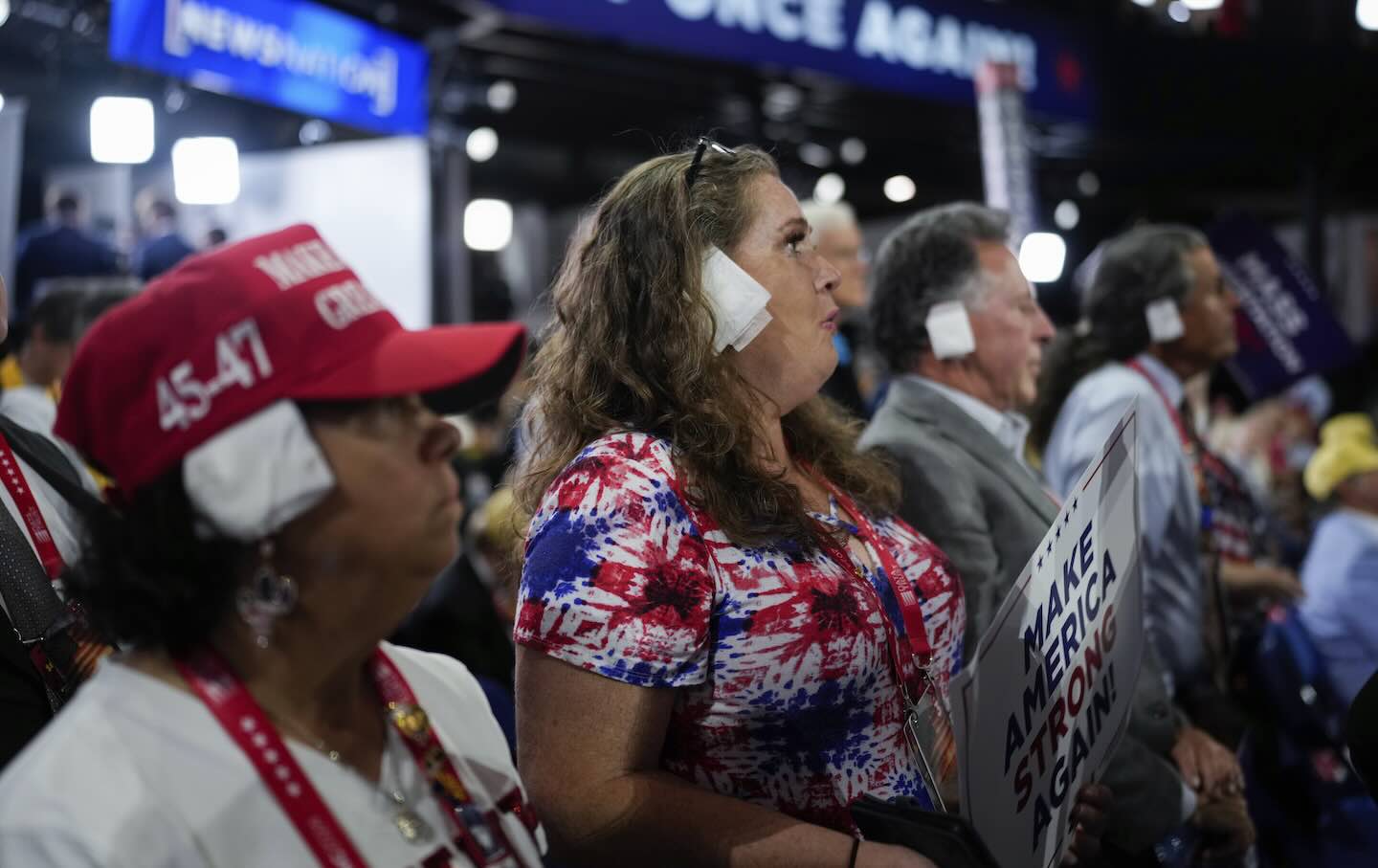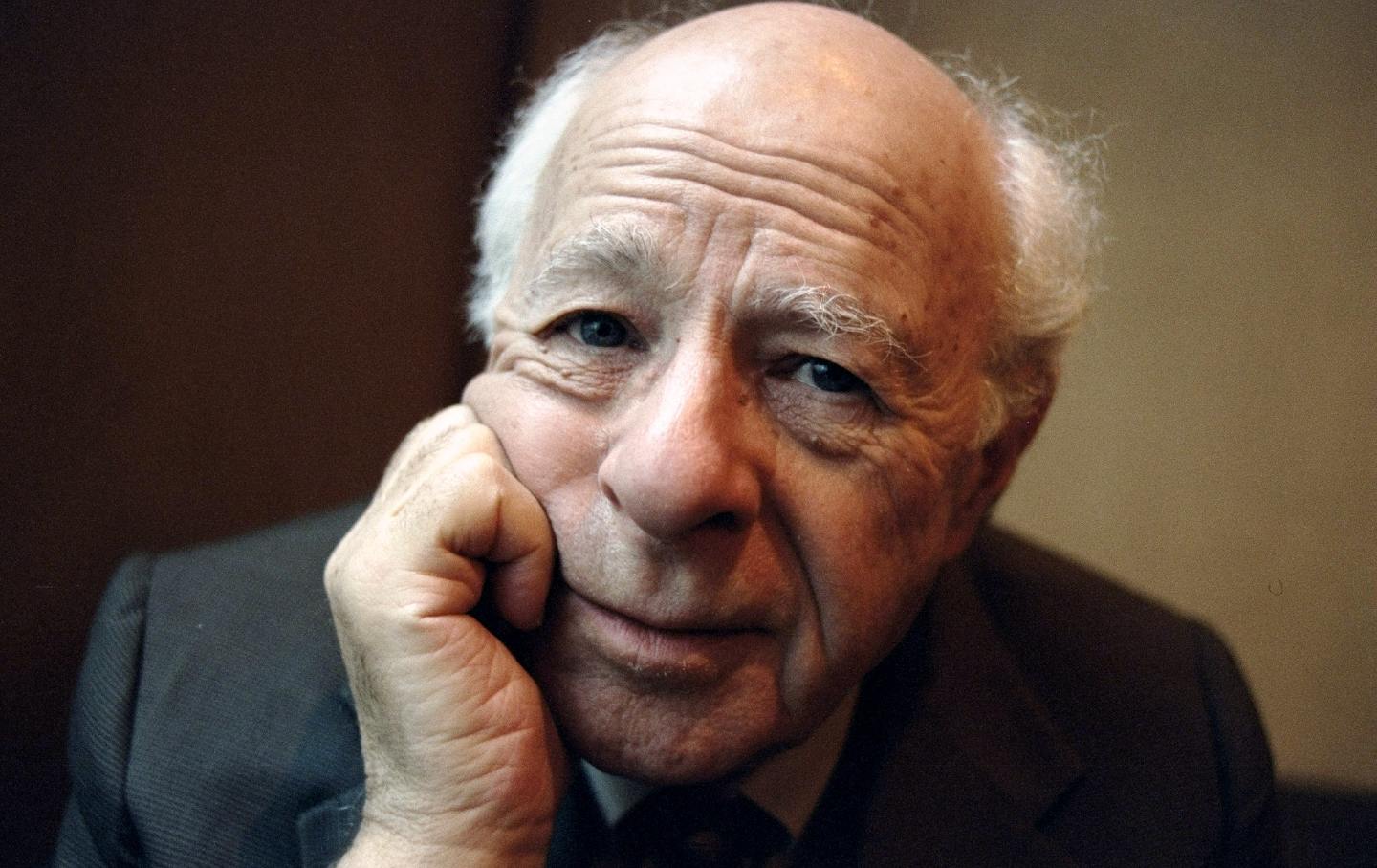Will Trump’s Ear Decide the Election?
If Biden stays in the race, it just might.

Delegates wear a bandage on their right ear during the Republican National Convention on July 17, 2024, in Milwaukee.
(Jae C. Hong / AP Photo)
Nearly three centuries ago, an ear changed the course of human history. In 1731, Spanish coast guards in the Caribbean boarded a British ship captained by one Robert Jenkins, and—in the ensuing melee—cut off one of his ears. The ear was salvaged, somehow, and kept in a pickling jar.
News traveled slowly in those days, but seven years later, Jenkins—who seems to have been essentially a privateer detailed by the English crown to raid Spanish galleons in the New World—appeared before a committee of the Houses of Parliament, the jar with his pickled ear in hand. The public was whipped up into a frenzy of indignation against the Spaniards and their ruthless, ear-cutting methods.
It was at least in part because of Jenkins’s testimony that the nascent British empire went to war with the Spanish empire, triggering an almost decade-long conflagration. Fighting erupted between the two imperial powers on multiple continents, including the southeastern region of what is now the United States, and that war—in merging with the War of Austrian Succession—helped reshape alliances and power dynamics across Europe and the New World.
Historians now call that war, which helped turbocharge the growth of the British empire, the War of Jenkins’ Ear.
Twenty twenty-four is a long way from 1731, and news today ricochets around the world in minutes, if not seconds, rather than in years. But despite the differences, there are also similarities. Once again, one man’s ear is having an outsize impact on the world order.
When, for reasons still unclear, Thomas Matthew Crooks used a high-powered rifle in his attempt to gun down Donald Trump last week, he narrowly missed his mark but succeeded instead in nicking the felonious ex-president’s ear. The image of a bloodied Trump rising, Phoenix-like, from the dais floor onto which he had ducked and where his security detail promptly covered him with protective layers of bodies, raising his fists and shouting out “Fight! Fight! Fight!” instantly became an iconic part of what these days passes for the national political “conversation.” So, too, days later when a triumphant Trump, his right ear covered in a white bandage, marched out to accept the adulatory praises of the GOP convention crowd, his national image was instantly reset.
I had thought it was impossible, but over the course of the half-week between when Trump’s ear took a bullet and when the GOP convention hit full swing, somehow the brutalist, corrupt, amoral, insurrection-inspiring, fascist-flirting, MAGA-man was remade in much of the popular imagination as almost sympathetic. Otherwise intelligent commentators, who had spent years chronicling the vast perils to American democracy represented by Trump, and who had often borne the brunt of Trump’s attacks against the political press—the “enemy of the people,” as he put it—suddenly were willing to respectablize the noxious candidate. Think of it as an exercise in cuddling cacti.
At the GOP convention, which party leaders originally set up as a MAGA-fest of vengeance and culture-war rage, delegates have, in the wake of the shooting, been feverishly at work making themselves out to look nice, reasonable even, and to somehow portray their extremist party as the party of unifiers and their demagogic, felonious leader as the candidate of moderation and humility—and of near-martyr-like victimhood.
Apparently, many of these delegates also have taken to walking the convention hall bedecked in sympathy bandages around their right ears. The stories remind me of one of novelist John Irving’s most brilliant, and disturbing, of creations. In his book The World According to Garp, a group of radical feminists, named the Ellen Jamesians after a child rape victim whose attackers had cut out her tongue, decide to cut off their own tongues in solidarity with her. This act of solidarity is grotesque, helping neither the victim herself nor those who claim to support her; it is, quite simply, a cruelly perverted, and entirely self-destructive, exhibitionism. It is also, Irving implies, an expression of faux-solidarity, solipsistic, entirely separate from the hard work of real change.
Looking at the images of the bandage-clad convention-goers, I can’t help but wonder whether it wouldn’t be more effective, in this grim moment, to embrace meaningful gun control legislation so that disturbed young men can’t get their hands on semiautomatic rifles and go off on killing sprees, as they are doing these days at a horrifyingly frequent rate in the United States. Or to look inward enough to maybe have second thoughts on nominating as candidate for president a man who, the vulnerability suggested by his bandaged ear notwithstanding, has repeatedly urged violence against his opponents, and who has ginned up a movement whose denizens time and again threaten to inflict bloodshed against elections workers, public health officials, librarians, and others who, for various reasons, offend the MAGA movement and its sensibilities. Or to wonder about what demons have been unleashed in the national psyche by events as destructive and bloody as the January 6, 2021, insurrection.
There is, of course, none of that in Milwaukee this week. In fact, while the GOP platform this time around doesn’t dwell on gun rights, there is no indication that the party has modified its firm commitment to the version of Second Amendment absolutism that has made the sale of high-powered assault rifles, such as the one used in the attempt to murder Trump, commonplace. There is no indication that fealty to Second Amendment absolutism won’t continue to be a litmus test for judicial nominees put forward by GOP presidents. There is no indication that the party will throw its support behind efforts to hold gun manufacturers liable for the carnage all too regularly meted out by gun-wielding madmen such as Crooks. Instead, we have an updated version of “thoughts and prayers,” ornamented by a bizarre pageant of bandaged ears and memes of bloodied Trump pumping his fists.
Politically, it’s little more than theater. Yet, given the vast weakness of Biden’s reelection campaign, it’s somewhat effective theater.
Trump’s foul candidacy has built significant momentum, while Biden’s candidacy slips deeper into crisis by the hour. His decrepit debate performance on June 27 has been only magnified by his stubborn, increasingly delusional ignoring of unfavorable opinion polls, and his extraordinarily messianic view that he, and only he, can serve as American democracy’s savior.
Had Trump’s ear not been nicked by a bullet, I’d have thought Biden might ride out the growing anger at his candidacy within the Democratic Party and beyond. I’d have thought he might have been able to muscle his way through to the convention, and then that his team would be able to strong-arm the party, its donors, and its activists into a reluctant submission. Inertia is, after all, a powerful force. Such an outcome would, I believe, have been a catastrophe, all but ensuring Trump’s return to power.
After the shooting, however, I can’t see how Biden’s candidacy survives. The contrast between Biden’s frailty and Trump’s adrenalin-fueled, fist-pumping response to his being shot at is too visceral. Trump and his ear are center stage. Biden, suffering a third bout of Covid, is in isolation—both literally and politically. It’s an untenable situation, and one that Democratic Party bigwigs are now all but publicly acknowledging.
The steady drip of stories about top Democrats—including former House speaker Nancy Pelosi, Senate Democratic leader Chuck Schumer, and House minority leader Hakeem Jeffries—all telling the president that he needs to end his campaign have reached a critical mass. The pressure is, at this point, surely relentless. On Wednesday, The Washington Post reported that former president Barack Obama now had grave doubts about the viability of Biden’s candidacy. Staying in the race, these senior figures are telling Biden, will ensure a historically disastrous GOP victory. Exit now, and there’s still time for the party to select a younger, more dynamic candidate who can take on felon Trump. Play it wrong, and the Democrats will be saddled with an entirely unelectable candidate. Play it right over the coming weeks, and—felon Trump’s bandaged ear notwithstanding—they can comprehensively reset the narrative about who is, and who isn’t, an American hero.
Disobey authoritarians, support The Nation
Over the past year you’ve read Nation writers like Elie Mystal, Kaveh Akbar, John Nichols, Joan Walsh, Bryce Covert, Dave Zirin, Jeet Heer, Michael T. Klare, Katha Pollitt, Amy Littlefield, Gregg Gonsalves, and Sasha Abramsky take on the Trump family’s corruption, set the record straight about Robert F. Kennedy Jr.’s catastrophic Make America Healthy Again movement, survey the fallout and human cost of the DOGE wrecking ball, anticipate the Supreme Court’s dangerous antidemocratic rulings, and amplify successful tactics of resistance on the streets and in Congress.
We publish these stories because when members of our communities are being abducted, household debt is climbing, and AI data centers are causing water and electricity shortages, we have a duty as journalists to do all we can to inform the public.
In 2026, our aim is to do more than ever before—but we need your support to make that happen.
Through December 31, a generous donor will match all donations up to $75,000. That means that your contribution will be doubled, dollar for dollar. If we hit the full match, we’ll be starting 2026 with $150,000 to invest in the stories that impact real people’s lives—the kinds of stories that billionaire-owned, corporate-backed outlets aren’t covering.
With your support, our team will publish major stories that the president and his allies won’t want you to read. We’ll cover the emerging military-tech industrial complex and matters of war, peace, and surveillance, as well as the affordability crisis, hunger, housing, healthcare, the environment, attacks on reproductive rights, and much more. At the same time, we’ll imagine alternatives to Trumpian rule and uplift efforts to create a better world, here and now.
While your gift has twice the impact, I’m asking you to support The Nation with a donation today. You’ll empower the journalists, editors, and fact-checkers best equipped to hold this authoritarian administration to account.
I hope you won’t miss this moment—donate to The Nation today.
Onward,
Katrina vanden Heuvel
Editor and publisher, The Nation
More from The Nation

The Longest Journey Is Over The Longest Journey Is Over
With the death of Norman Podhoretz at 95, the transition from New York’s intellectual golden age to the age of grievance and provocation is complete.

The Shocking Confessions of Susie Wiles The Shocking Confessions of Susie Wiles
Trump’s chief of staff admits he’s lying about Venezuela—and a lot of other things.

The King of Deportations The King of Deportations
ICE’s illegal tactics and extreme force put immigrants in danger.

The Epstein Survivors Are Demanding Accountability Now The Epstein Survivors Are Demanding Accountability Now
The passage of the Epstein Files Transparency Act is a big step—but its champions are keeping the pressure on.

Mayor of LA to America: “Beware!” Mayor of LA to America: “Beware!”
Trump has made Los Angeles a testing ground for military intervention on our streets. Mayor Karen Bass says her city has become an example for how to fight back.

Breaking the LAPD’s Choke Hold Breaking the LAPD’s Choke Hold
How the late-20th-century battles over race and policing in Los Angeles foreshadowed the Trump era.


